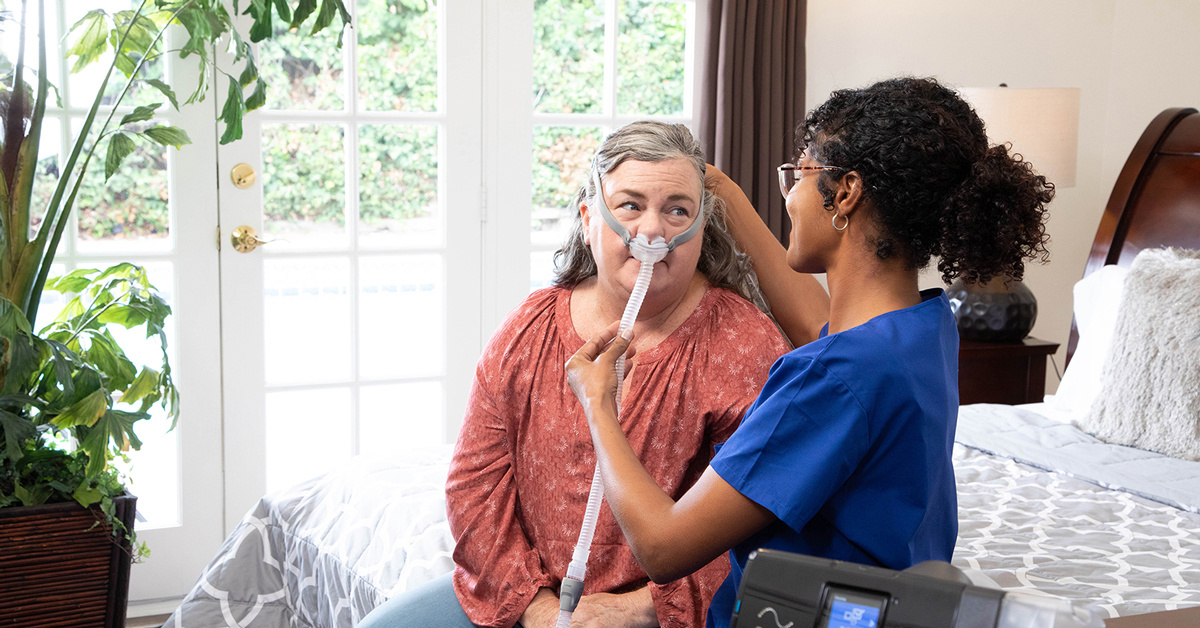HOW USING TECHNOLOGY HELPS DMES STAY CONNECTED TO PATIENTS DURING THEIR SLEEP JOURNEY
In the ever-changing world of healthcare, it’s important that the durable medical equipment (DME) provider chosen for your patients embraces modern technologies. This is essential for delivering timely and effective care for sleep apnea patients. Such technologies should include e-prescribing, remote patient monitoring, as well as self-directed and virtual CPAP setups, complemented by automated resupply shipments. Selecting a provider that integrates these technologies into their sleep care program is crucial for maintaining a continuous connection with patients on their sleep journey, thereby enhancing the quality of patient care and improving operational efficiencies.
STREAMLINING THE REFERRAL PROCESS
The journey to effective patient care begins with the referral process, which sets the tone for the entire treatment experience. Efficiency and accuracy at this stage can significantly impact patient outcomes. Providers should offer various referral methods to match the preferences and technological capabilities of healthcare professionals, ensuring a seamless transition from diagnosis to treatment.
Modern Referral Methods: Accuracy and Efficiency
E-prescribing platforms, such as DMEScripts and Parachute Health, simplify the scripting and order writing process, offering a no-cost solution that improves accuracy and efficiency from the initial referral to treatment initiation. It supports physicians in delivering timely and precise care, automating medical equipment orders to allow providers to focus on patient care. In fact, a recent study showed that 92% of patients reported they are happy their doctor uses e-prescribing1.
writing process, offering a no-cost solution that improves accuracy and efficiency from the initial referral to treatment initiation. It supports physicians in delivering timely and precise care, automating medical equipment orders to allow providers to focus on patient care. In fact, a recent study showed that 92% of patients reported they are happy their doctor uses e-prescribing1.
Traditional Referral Methods: Flexibility and Personal Touch
A Google study revealed that 57% of people prefer calling a business for quick answers rather than reaching out online2. This preference underscores the need for options that cater to immediate and direct communication for providers. For providers inclined towards traditional methods, the availability of direct phone communication and fax orders is invaluable. These methods ensure swift interaction as well as the secure transmission of documentation.
The Benefits of Diverse Referral Methods
By offering both modern and traditional referral methods, DMEs can cater to the unique needs of healthcare providers, ensuring:
- Flexibility, which helps reduce barriers to efficient patient care.
- Improved accuracy and efficiency through e-prescribing platforms which help ensure all required information is accurately captured, leading to quicker order processing and fewer delays for patients.
- Enhanced communication, so providers are always kept to date on the status of their orders.
Whether it is through traditional phone calls and faxes or e-prescribing platforms, DMEs can help ensure a streamlined, efficient, and accurate referral process. The use of these different technologies allows healthcare professionals to focus more on their patients and less on paperwork, ultimately enhancing the patients’ experiences and their satisfaction in managing sleep apnea.
PERSONALIZING PATIENT EDUCATION AND CPAP SETUP
Following the referral, the focus shifts to patient education and PAP device setup—critical steps that lay the foundation for successful treatment adherence. In fact, a study has shown that patient education, including viewing polysomnography charts, followed by frequent visits, can significantly increase long-term compliance with PAP treatment3.
It is, therefore, imperative for durable medical equipment providers to establish an immediate connection with patients upon receipt of their PAP therapy device. Providing continuous education and support through regular touchpoints—such as phone calls, texts, or emails—ensures that any issues are promptly identified and addressed. This proactive engagement is key to resolving common challenges like improper equipment use or discomfort, which are crucial for maintaining patient compliance and satisfaction.

Supported by modern technologies like video chat, QR code resources, and text messaging for resupply, DME providers ensure each patient receives customized setup assistance. This adaptability not only enhances patient convenience but also promotes adherence to therapy, ultimately leading to better treatment outcomes.
PROVIDING ONGOING SLEEP CARE AND CPAP ADHERENCE MONITORING
Despite the importance of CPAP therapy, research shows that as many as half of all patients discontinue use or misuse their devices within the first year4. To combat this, durable medical equipment providers should be actively monitoring patient adherence as part of their sleep care program, in addition to equipment setup and ongoing support.
In fact, a recent study showed that telemonitoring and automated reporting helped make patients 2.4 times more likely to achieve Medicare-level adherence to their PAP therapy5. This vigilant approach ensures that patients fully benefit from their treatment and that any issues are promptly addressed, thereby enhancing the overall success of sleep apnea management.
Utilizing Technology for Therapy Adherence Monitoring
DMEs use cloud-based patient management software integrated into PAP devices for real-time therapy adherence monitoring. This software allows sleep coaches to remotely track patient usage data, which healthcare providers can review to make informed decisions regarding treatment adjustments and interventions. This proactive approach ensures patients receive personalized care aligned with their specific needs, promoting improved compliance and therapy effectiveness.
Supporting Compliance Through Sleep Coach Guidance
With remote patient monitoring, sleep coaches can identify early signs of reduced patient engagement with therapy, enabling timely intervention through supportive communication. Normalizing their challenges and reinforcing the importance of therapy helps maintain patient compliance and fosters a positive attitude towards treatment.
Take a look at these examples of other strategies used by Apria’s sleep coaches to prevent non-compliance with CPAP therapy:
- Education and Training: They educate patients about the importance of CPAP therapy for managing sleep apnea and its long-term benefits. They set up the patient’s equipment and teach them how to use it. Proper understanding of compliance and equipment encourages patients to adhere to treatment.
- Equipment Optimization: Ensuring patients have well-fitted masks and comfortable equipment reduces discomfort and encourages regular use.
- Troubleshooting Support: Addressing common issues like mask leaks or discomfort promptly can prevent frustration and improve compliance.
- Behavioral Strategies: Providing tips and strategies to incorporate CPAP therapy into daily routines effectively encourages consistent use.
- Monitoring and Feedback: Regularly reviewing adherence data allows sleep coaches to identify early signs of non-compliance and intervene proactively.
- Patient Engagement: Establishing a supportive relationship through regular check-ins via phone calls, text, or email helps maintain motivation and accountability.
- Adjustment of Therapy: Collaborating with physicians to adjust therapy settings or explore alternative treatments like BiPAP if CPAP is not tolerated ensures patients receive effective care tailored to their needs.
- Continuous Education: Offering ongoing education about sleep apnea and the importance of compliance reinforces patient commitment to therapy.
By utilizing sleep coaches that implement these strategies, DMEs can effectively support patients in overcoming barriers to adherence, promoting successful CPAP therapy outcomes.
MAXIMIZING THERAPY EFFECTIVENESS WITH TIMELY PAP RESUPPLY
Effective PAP therapy relies on regular equipment replacement and resupply. Often, patient do not fully understand the importance of timely replacements. Durable medical equipment providers can address these challenges by proactively educating patients on equipment replacement needs based on usage and manufacturer recommendations. Additionally, DMEs can improve patient care by offering an automated resupply service. This service ensures that patients consistently receive their masks, filters, and other necessary supplies on time.
Optimizing the Resupply Workflow
To streamline the resupply process, DMEs like Apria utilize a multi-channel reminder system, encompassing text messages, emails, and phone calls, to guarantee that patients receive their supplies without delay. This proactive strategy not only reduces the likelihood of errors but also bolsters the accuracy of supply management. In addition, Apria’s dedicated sleep coaches offer regular consultations to address common concerns such as mask fit and patient comfort, thereby elevating the efficacy of the therapy and patient contentment.
Convenient Resupply Options for Patients
Apria, for example, presents a suite of resupply options tailored to meet the diverse needs of patients:
![]() Automatic Enrollment in Supplies on Schedule: Patients are automatically enrolled based on their insurance plan to receive regular shipments of supplies, eliminating the need for manual order placement. This service is flexible, allowing patients to opt-out at any time and use one of the methods below instead.
Automatic Enrollment in Supplies on Schedule: Patients are automatically enrolled based on their insurance plan to receive regular shipments of supplies, eliminating the need for manual order placement. This service is flexible, allowing patients to opt-out at any time and use one of the methods below instead.
![]()
Personalized Assistance from a Sleep Coach: Patients have the option to engage with Apria’s Sleep Resupply Specialist for bespoke support.
![]()
24-Hour Automated Reordering: Patients can effortlessly reorder supplies anytime through Apria’s automated phone system.
![]()
Self-Service Online Ordering: For those who prefer self-management, patients can place orders and review past transactions via Apria’s patient portal.
![]()
Direct Online Shopping: Apria also offers a direct retail site for purchasing supplies or equipment not covered by insurance, providing a cash-only option for patients.
This initiative-taking approach improves patient satisfaction and allows physicians to focus on clinical care rather than administrative tasks related to CPAP supplies. By partnering with a DME provider that integrates resupply technology, such as Apria, healthcare providers can effectively support their patients in managing sleep apnea treatment, potentially contributing to improved overall patient outcomes.
ENHANCING PATIENT CARE WITH E-COMMERCE SOLUTIONS
Durable medical equipment providers are adopting e-commerce platforms to enhance patient access to supplies. These platforms allow patients to conveniently order a variety of PAP supplies from home, including items like travel CPAP machines and accessories that might not be covered by insurance.
One such example is ApriaDirect, Apria Healthcare’s integrated e-commerce platform. It demonstrates how seamless integration with patient management systems can simplify the ordering process. Patients can easily navigate the platform to manage their therapy needs, ensuring they receive their supplies without any treatment gaps.
This move towards e-commerce by DME providers not only makes ordering supplies more convenient but also improves the overall management of patient care, making it more accessible and efficient. By providing an uninterrupted supply of necessary items, e-commerce platforms like ApriaDirect support better treatment adherence and patient outcomes.
THE IMPACT OF TECHNOLOGY ON PATIENT CARE FOR DMES AND PHYSICIANS
In today’s high-volume healthcare environment, durable medical equipment providers who incorporate these technologies into their sleep care programs can streamline workflows and alleviate administrative burdens. This technological integration allows healthcare providers to prioritize patient care while improving service quality and therapy effectiveness. Most importantly, technology plays a crucial role in supporting patients throughout their sleep journey.
For example, Apria uses technology to encourage patient compliance by offering intuitive tools for managing therapy, personalized coaching to use equipment effectively, and continuous education to emphasize the importance of regular treatment adherence.
Apria Healthcare demonstrates this use of technology within their sleep care program:
- From seamless referrals and precise equipment ordering via e-prescribing,
- To continuous remote monitoring ensuring therapy effectiveness and patient well-being,
- Multichannel communication methods and automated reminders keep patients engaged and informed,
- Diverse PAP setup options promote adherence through personalized guidance,
- ApriaDirect's integrated e-commerce platform consolidates patient needs, enhancing care management.
Through these various technologies, DMEs like Apria Healthcare can not only streamline patient care but also empower healthcare providers to deliver quality care efficiently. By leveraging technology to stay connected with patients and optimize treatment outcomes, Apria sets a standard for improving patient satisfaction and the effectiveness of sleep apnea management.
Are you ready to experience the difference that Apria Healthcare’s innovative solutions can make in your practice and for your patients? We invite you to explore our services and see firsthand how our technology can enhance the management of sleep apnea.
Sources:
- Office of the National Coordinator for Health Information Technology. (n.d.). Improved Diagnostics & Patient Outcomes. HealthIT.gov. Retrieved from https://www.healthit.gov/topic/health-it-and-health-information-exchange-basics/improved-diagnostics-patient-outcomes
- Google. (n.d.). Click-to-Call Research Studies. Retrieved from https://think.storage.googleapis.com/docs/click-to-call_research-studies.pdf
- Saraç, S., Afşar, G. Ç., Oruç, Ö., Topçuoğlu, Ö. B., Saltürk, C., & Peker, Y. (2017). Impact of Patient Education on Compliance with Positive Airway Pressure Treatment in Obstructive Sleep Apnea. Medical science monitor: international medical journal of experimental and clinical research, 23, 1792–1799.https://doi.org/10.12659/msm.902075
- >Nogueira, J. F., Simonelli, G., Giovini, V., Angellotti, M. F., Borsini, E., Ernst, G., & Nigro, C. (2018). Access to CPAP treatment in patients with moderate to severe sleep apnea in a Latin American City. Sleep science (Sao Paulo, Brazil), 11(3), 174–182. https://doi.org/10.5935/1984-0063.20180032
- Hwang, D., Chang, J. W., Benjafield, A. V., Crocker, M. E., Kelly, C., Becker, K. A., Kim, J. B., Woodrum, R. R., Liang, J., & Derose, S. F. (2018). Effect of Telemedicine Education and Telemonitoring on Continuous Positive Airway Pressure Adherence. The Tele-OSA Randomized Trial. American journal of respiratory and critical care medicine, 197(1), 117–126. https://doi.org/10.1164/rccm.201703-0582OC


.png)



